21 Apr2020
AACTE DEI Video: The Importance of Equitable Disciplinary Actions in Schools
By Jerrica Thurman
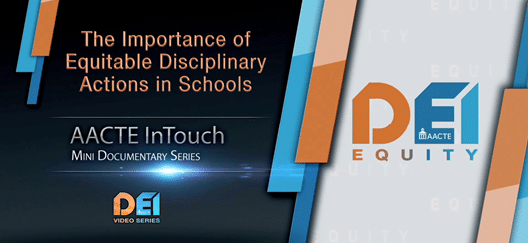
Ed Prep Matters features the “Revolutionizing Education” column to spotlight the many ways AACTE, member institutions, and partners are pioneering leading-edge research, models, strategies and programs that focus on the three core values outlined in the current AACTE strategic plan: Diversity, Equity, and Inclusion; Quality and Impact; and Inquiry and Innovation.
In this segment of the AACTE Diversity, Equity and Inclusion video series, AACTE members promote equitable disciplinary practices for teachers to use as restorative measures to build positive relationships with students. The video segment, The Importance of Equitable Disciplinary Actions in Schools, addresses the importance of eliminating prejudgments so educators can better understand students’ contexts and backgrounds and develop a new lens for addressing disruptive behaviors in schools.
07 Apr2020
AACTE Responds to COVID-19
By Lynn M. Gangone and Jacqueline Rodriguez

With the onset of the coronavirus (COVID-19), school districts, institutions of higher education, and educators are finding themselves in uncharted territory. As schools across the nation are forced to shut their doors, finding ways to best serve all students equitably has never been more urgent. This is especially true for our most vulnerable students—those with disabilities.
COVID-19 hit hard and fast. And with that, so did the shift from in-school instruction to online learning. We know that special education students receive, consume, and apply information differently in face-to-face settings versus online environments. However, the rapid onset of COVID-19 did not give educators, parents, or students time to adequately prepare for the transition.
23 Mar2020
AACTE Responds to COVID-19
By Deborah Koolbeck
As the United States responds to the COVID-19 pandemic, federal agencies connected to the education and care of our nation’s higher education and PK-12 students are releasing information and guidance for taking action, as well as flexibilities and waivers offered.
The U.S. Department of Education offered a phone call to K-12 stakeholder on Friday March 20, 2020, with officials from the Department, the CDC, and the U.S. Department of Agriculture. The Department has posted a readout of the call, with links to resources on servicing students with disabilities, student loan relief, student privacy, and more.
Main Links for COVID-19 Information
U.S. Department of Education
U.S. Department of Agriculture Food and Nutrition Service
Centers for Disease Control
23 Mar2020
AACTE Responds to COVID-19
By Jane E. West
This blog post is written by AACTE consultant Jane West and is intended to provide updated information. The views expressed in this post do not necessarily reflect the views of AACTE.
Washington Continues to Respond to the Coronavirus Epidemic
The Congress and federal agencies are likewise making changes by the moment. A 50,000 foot overview includes the following.
Legislative activity
- On March 6, Congress passed the first COVID-19 stimulus bill – an $8 billion package to help states and localities address the pandemic.
- On March 18, Congress passed the second COVID-19 relief package, which ensures paid sick leave to certain employees, expands SNAP and Medicaid, and provides emergency assistance.
- Congress is now considering the third COVID-19 relief package, a measure which will total between one and two trillion dollars and may address issues as far reaching as increases in unemployment insurance payments, financial assistance for hospitals and health care providers, a “state stabilization fund,” direct cash payments of $1,200 per qualified person, small business guaranteed loans, and billions in loans for industries, such as airlines. Provisions related to education are also on the menu, as described in the next article.
23 Mar2020
By U.S. Department of Education
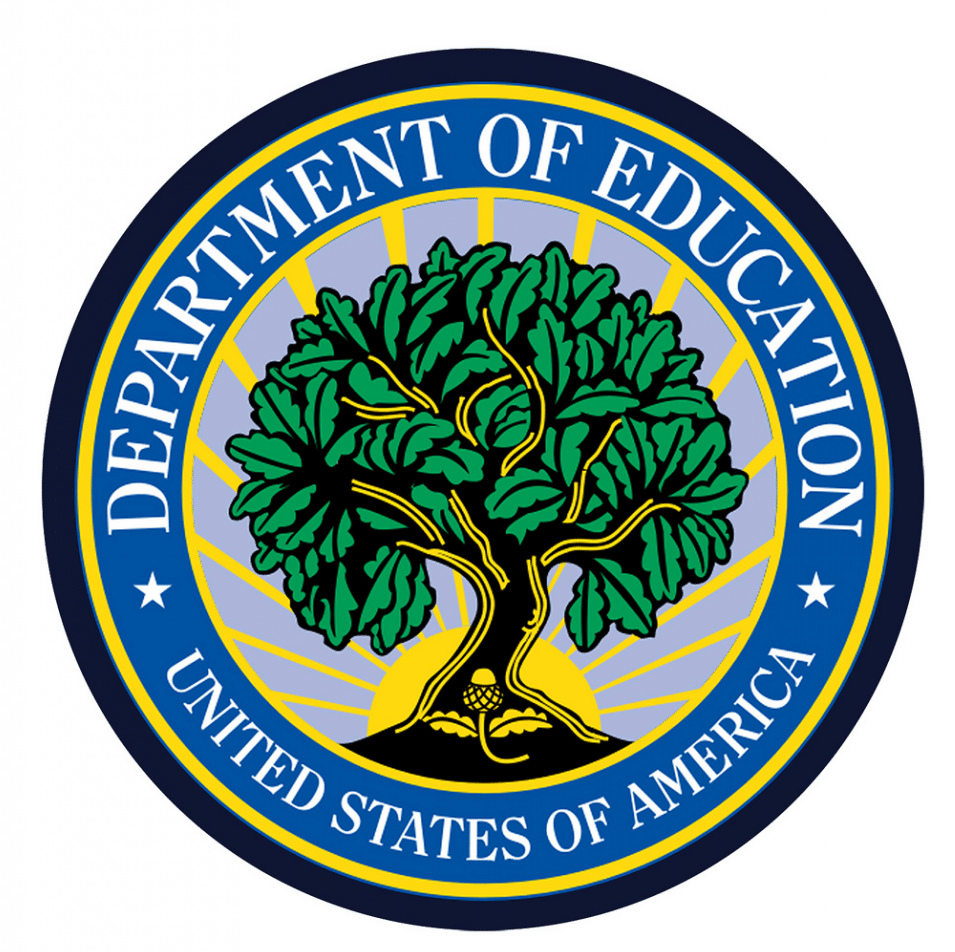 U.S. Secretary of Education Betsy DeVos announced today the Department has released new information clarifying that federal law should not be used to prevent schools from offering distance learning opportunities to all students, including students with disabilities. This new resource from the Office for Civil Rights (OCR) and the Office of Special Education and Rehabilitative Services (OSERS) explains that as a school district takes necessary steps to address the health, safety, and well-being of all its students and staff, educators can use distance learning opportunities to serve all students.
U.S. Secretary of Education Betsy DeVos announced today the Department has released new information clarifying that federal law should not be used to prevent schools from offering distance learning opportunities to all students, including students with disabilities. This new resource from the Office for Civil Rights (OCR) and the Office of Special Education and Rehabilitative Services (OSERS) explains that as a school district takes necessary steps to address the health, safety, and well-being of all its students and staff, educators can use distance learning opportunities to serve all students.
“It was extremely disappointing to hear that some school districts were using information from the Department of Education as an excuse not to educate kids,” said Secretary DeVos. “This is a time for creativity and an opportunity to pursue as much flexibility as possible so that learning continues. It is a time for all of us to pull together to do what’s right for our nation’s students.”
17 Mar2020
By Jerrica Thurman

The AACTE 2020 Annual Meeting Opening keynote speaker Robin DiAngelo, associate professor of education at the University of Washington, is widely recognized for her research in critical discourse analysis and whiteness studies. In her address, she explored how to implement strategic, intentional anti-racist actions to interrupt the system of racism in education. Her message aligns with AACTE’s core value of diversity, equity, and inclusion an integral part of AACTE’s strategic plan for 2020-23.
“The status quo of this society is racism; it is not an aberration, it’s the norm. All of our institutions effectively and efficiently reproduce racial inequality and schools are the bellies of the beast,” said DiAngelo. She noted that the concept examining the dominant culture is consistently left off the table in the conversation when discussing race issues. These discussions tend to focus on learning about other racial groups.
During her talk, she emphasized the need to decenter “whiteness” by naming it and exposing it, explaining that there is a white worldview, a white frame of reference that allowed her to move through the world from a white experience. DiAngelo shared, “Being white, I was not raised to see myself in racial terms” She reasoned that as a white person, “when we talk about race it’s about their race not mine.” She acknowledged the complexities of racism and the inability to understand every nuance. “But it’s on me to get that information, not on people of color to hand it to us.”
16 Mar2020
By AACTE
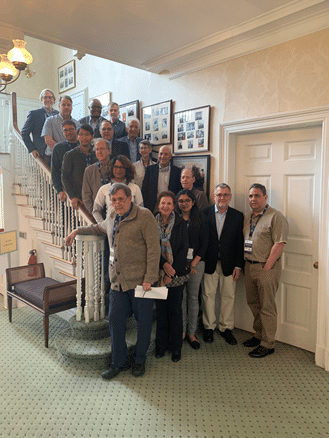 An excerpt from this article appeared in District Administration on March 11.
An excerpt from this article appeared in District Administration on March 11.
Today, we live in a society where truth is decaying, falsehoods are readily shared across social media, and hatred and discrimination are on the rise. According to the Southern Poverty Law Center the number of hate groups operating in the United States hit a record high in 2018. Hate speech creates an environment in which biases and discrimination thrive and can have a detrimental impact on a school’s culture and climate. Teaching and learning about the roots of hate are important elements in fostering an inclusive classroom environment.
Teachers play an essential role in creating a more humane and tolerant world. They are stewards of culture and are in a position to protect history, promote facts and prevent inhumanity. However, to provide students with the most effective instruction, educators must have the tools to understand the nature of hate crimes and how they impact the culture and climate of schools where they teach. Additionally, they must know how to address issues of bias and discrimination in the classroom.
06 Mar2020
By Anna Stolley Persky
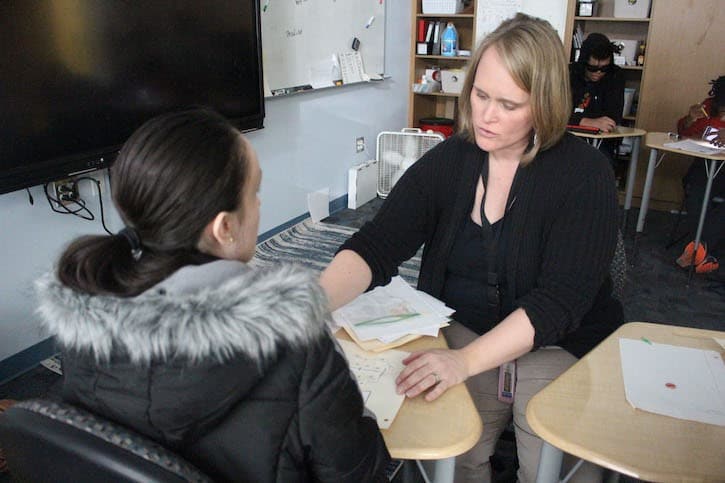
Julie Conner, a teacher at the Virginia School for the Visually Impaired, works with a female student with vision impairment.
This article originally appeared on the George Mason University website and is reprinted with permission.
The United States is in desperate need of educators who can read and teach braille, according to the National Federation of the Blind (NFB). Less than 10% of the 1.3 million people who are legally blind in the U.S. are able to read braille, according to a 2009 report by the NFB.
But few U.S. colleges offer programs that prepare teachers to educate students who are visually impaired, according to Kimberly Avila, professor-in-charge of the teacher preparation program in blindness and vision impairment within the College of Education and Human Development. Avila is also the coordinator for the Virginia Consortium for Teacher Preparation in Vision Impairment.
04 Mar2020
By Dustin Wunderlich
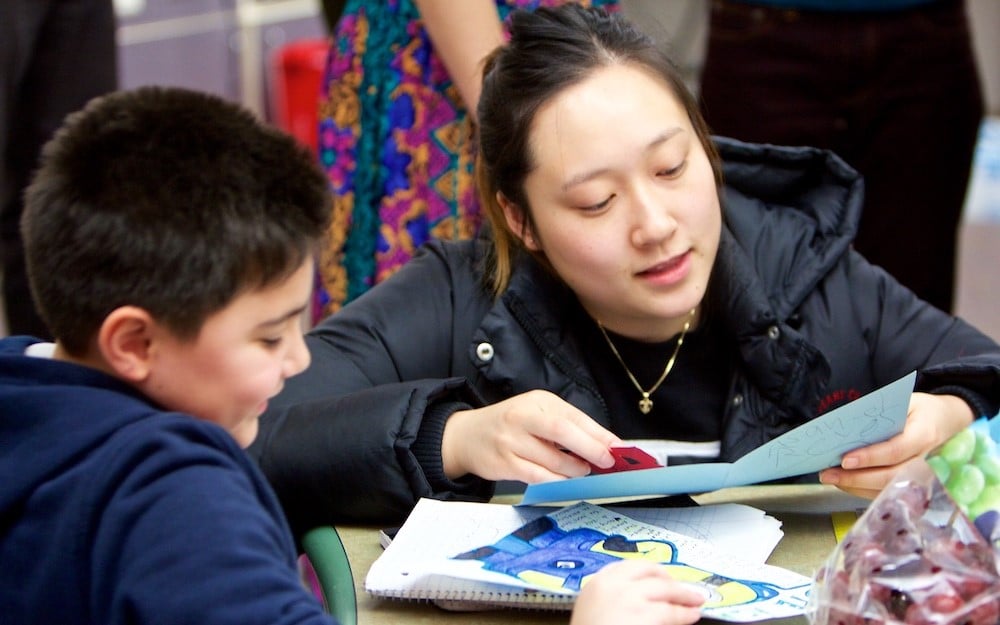
This article originally appeared on the University of Washington College of Education website and is reprinted with permission.
Back in 2017, the University of Washington’s Elementary Teacher Education Program (ELTEP) enrolled its first cohort of teacher candidates in which more than half were people of color and more than half spoke a language in addition to English.
While the diversity of the cohort was welcome — particularly in a state where 89 percent of teachers are white but students of color make up nearly 50 percent of public school enrollment — it also meant UW teacher educators needed to reassess their program.
“When we admitted our first group of very diverse students, I went to the faculty and said ‘We’ve got a gift’,” said Teddi Beam-Conroy, director of the UW’s Elementary Teacher Education Program. “Most efforts [to diversify the teaching workforce] concentrate on recruiting students, and they’re here. So now we have to talk about how we’re going to change to meet their needs. What do we need to do in order to sustain and learn from the students we have with us?”
29 Feb2020
AACTE Conference Addresses How to Disrupt Inequities in Education
By AACTE
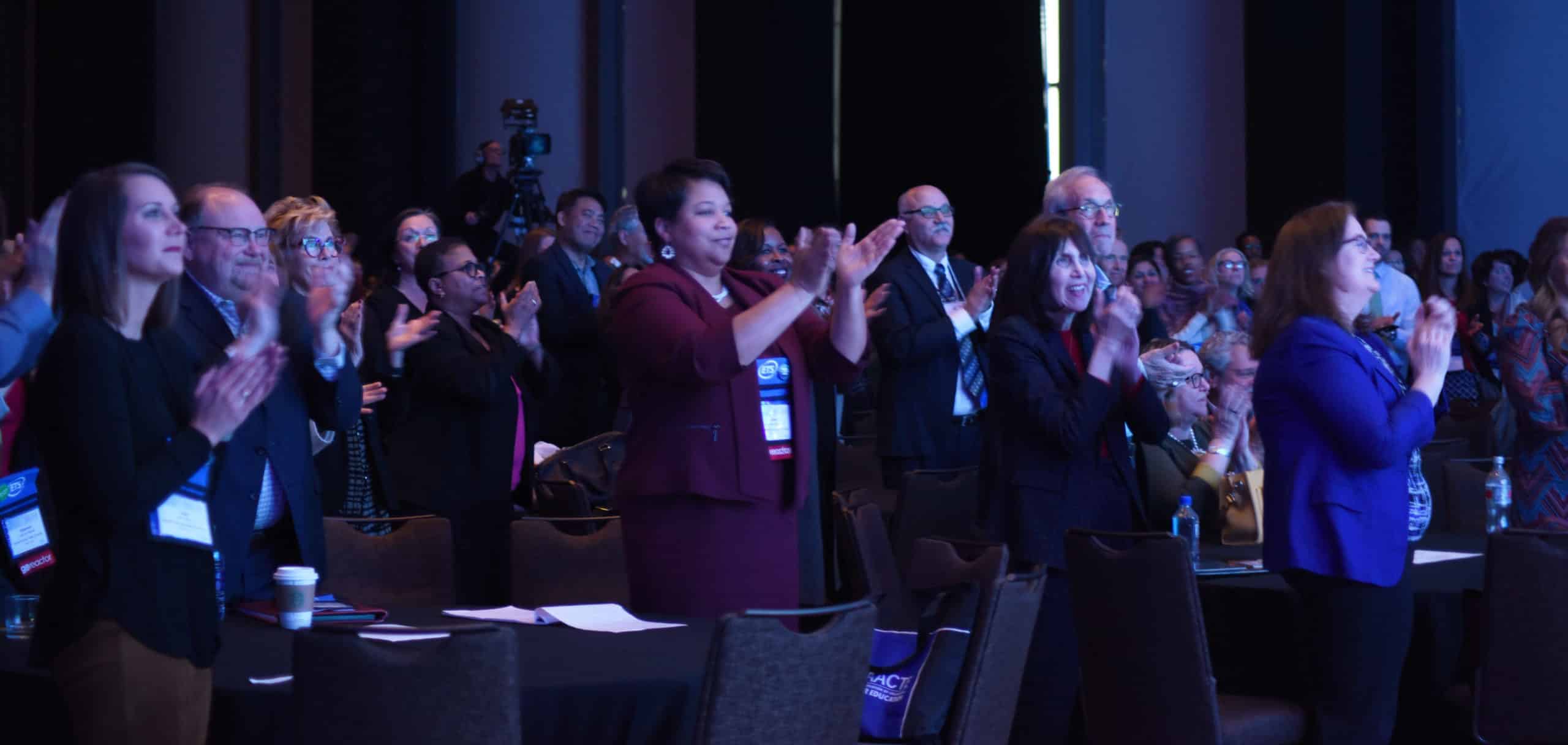
Nearly 2,000 teacher educators kicked off the 72nd Annual Meeting of the American Association of Colleges for Teacher Education (AACTE) at the Atlanta Marriott Marquis yesterday. The conference, themed “Disrupting Inequities: Educating for Change,” is being held February 28 – March 1. Attendees include deans, faculty, students, and administrators from undergraduate and graduate education programs, community colleges, and K-12 schools, as well as representatives from state and federal agencies, nonprofit organizations, and foundations.
America’s educator preparation community is keenly aware of and uniquely positioned to change the systemic challenges occurring in PK-16 environments that serve the nation’s most vulnerable populations—students of color, students with disabilities, students from immigrant families, students from low-income families, and LGBTQ students. Under its 2020 theme, the AACTE conference offers attendees hundreds of concurrent sessions that explore how to redefine the meaning of success for all students and encourage them to become active learners, productive citizens, critical thinkers, and leaders in their communities and across the globe.
26 Feb2020
By Kimberly White Smith

The American education system was not created to support the liberation of the powerless. Instead, it was designed to instill skills, habits, beliefs, and discipline that would allow for better control of the masses. The colonizers who became the architects of this country built a system that perpetuates the status of white-skinned privilege and wealth, while leaving those in the lower and middle classes burdened with the laborious task of building and supporting our nation’s economy and infrastructure.
Throughout the history of the United States, minoritized racial groups and those who live in poverty have suffered disparities in education through laws and policies that prohibited them from socioeconomic advancement, physical safety, and basic civil rights. The anti-literacy laws enacted before, during, and after the Civil War are just one example of how white-skinned privilege and power was used to perpetuate the oppression of enslaved Blacks and concretize a system that generated more wealth for those in power.
Our current education system continues to enable inequity through policies and practices that claim to be fair, colorblind, and neutral, but tend to privilege a small, elite portion of the U.S. population. We can no longer live by the adage “pull yourself up by your bootstraps,” when those who deserve a better education continue to be plagued by disparities. Addressing the persistent opportunity gap between our nation’s socioeconomic classes requires sustained engagement from leaders across every field of education.
21 Feb2020
By Dustin Wunderlich
The articles below originally appeared on the University of Washington College of Education website and are reprinted with permission.
Jo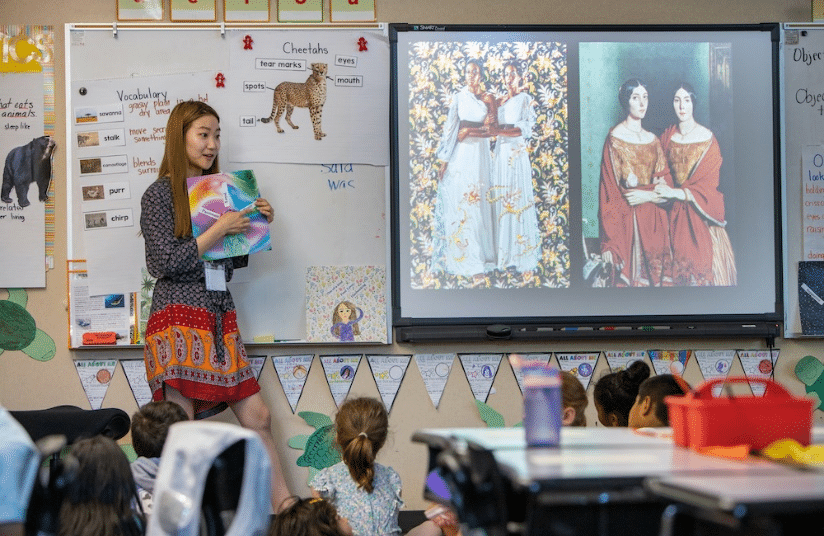 ining doctoral research and teacher education program improvement
ining doctoral research and teacher education program improvement
While incorporating issues of equity and social justice in the preparation of future teachers has long been a focus at the University of Washington College of Education, it wasn’t well understood until recently how that commitment is reflected in graduates’ daily teaching practice.
That picture is getting clearer thanks to an internship for UW doctoral students in teacher education launched three years ago. In a new podcast, Patrick Sexton, assistant dean for teacher education, and Cristina Betancourt, a graduate student in teaching and curriculum, discuss the College’s work to marry teacher education program improvement with the learning of its doctoral students through its Teacher Education Research and Inquiry (TERI) internship.
Sexton and Betancourt are part of a team who will present their work developing case studies of recent alumni for program improvement at the 2020 meeting of the American Association of Colleges for Teacher Education.
Read more.
Incorporating disability studies curriculum in teacher education
While Washington has recognized October as Disability History Month for more than a decade — and schools are asked to honor the month in some fashion — teachers have had limited resources available to help them actually enact disability studies curriculum in the classroom.
21 Feb2020
By Leslie T. Fenwick
This article first appeared in Education Week on October 9, 2013 and is reprinted with permission from the author, AACTE Dean in Residence Leslie T. Fenwick.
There’s a troubling undercurrent to the national conversation about the black-white gap in student achievement. The (mostly) unspoken belief about black students is tied to broader perceptions about black people. So, let’s just say it: Some believe the gap is a function of weak family and community structures, male joblessness, drug use, and permissive cultural values—which they assert predominate in the black community.
Others believe that blacks constitute a community that is largely beyond intervention and that no amount of funding or special programs can fix what ails the perpetually troubled. An attendant assertion is that blacks who do achieve have outsmarted stereotype vulnerability and are outliers. Some say these blacks are exceptions and are successful because they embrace and actualize a white cultural-value system.
20 Feb2020
By Terrance McNeil
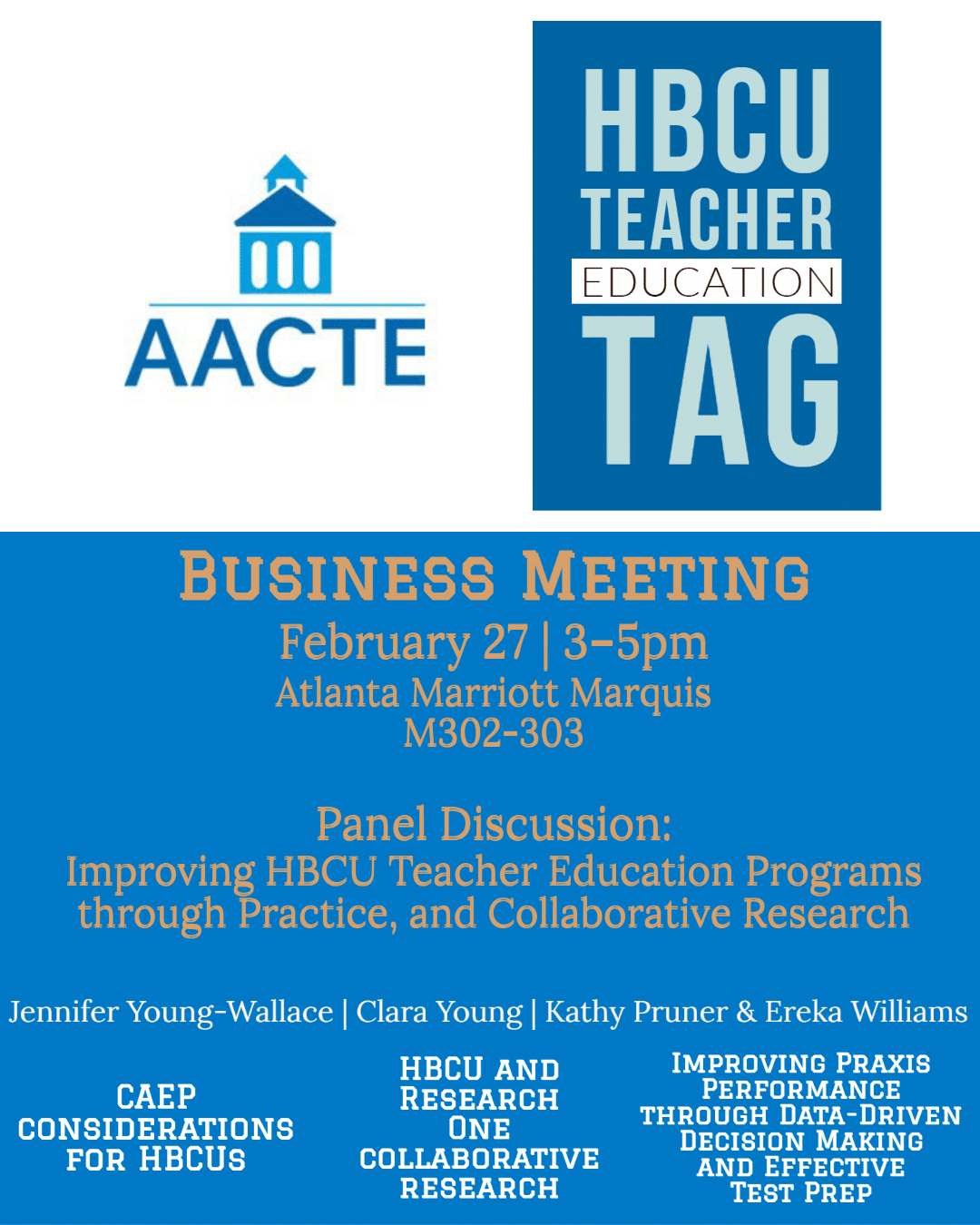 As the AACTE 72nd Annual Meeting theme suggests, decades of societal inequities extending into and from our P-16 institutional environments have left us hungry for change. Persistent achievement gap disparities and teacher shortages trouble us and often make us wonder how we will achieve the changes we seek. In terms of teacher diversity, one solution that many have found are the Educator Preparation programs at Historically Black Colleges and Universities (HBCUs). While making up only 3% of the nation’s higher education institutions, HBCUs provide over 50% of the nation’s African American teachers.
As the AACTE 72nd Annual Meeting theme suggests, decades of societal inequities extending into and from our P-16 institutional environments have left us hungry for change. Persistent achievement gap disparities and teacher shortages trouble us and often make us wonder how we will achieve the changes we seek. In terms of teacher diversity, one solution that many have found are the Educator Preparation programs at Historically Black Colleges and Universities (HBCUs). While making up only 3% of the nation’s higher education institutions, HBCUs provide over 50% of the nation’s African American teachers.
Several research projects and partnerships on the district and institutional level are demonstrating the capacity for HBCUs to bring their unique positionality to bear in the broader conversation on teacher diversity. A recent project involving Virginia Commonwealth University and Tennessee State University bears the potential to help the academic community understand more about creating a culturally responsive teacher workforce. Similarly, the “Call Me Mister” program and the “Florida Fund for Minority Teachers” historically have involved HBCUs in recruiting African American teachers. Through a variety of works, HBCUs continue to improve on their capacity to influence the teacher diversity conversation.
This year’s HBCU Teacher Education Topical Action Group (TAG) Business Meeting, which will take place February 27 at 3:00 p.m, will bring together AACTE members with over two dozen HBCU affiliations. Participants need not be HBCU graduates or currently working at an HBCU. The meeting will feature conversations on HBCU-led research agendas, proposed partnerships, CAEP accreditation, and improving preservice teacher performance on the Praxis. We are excited to have Ereka Williams of Fayetteville State University, Kathy Pruner, director of Professional Educator Programs at ETS, Jennifer Young-Wallace, Association of Teacher Educators board members, and Clara Young of Tennessee State University as contributors to this year’s business meeting.
13 Feb2020
By Katrina Norfleet

The Council of Chief State School Officers (CCSSO) recently updated its Supporting Inclusive Schools for the Success of Each Child: A Guide for States on Principal Leadership guide. Developed in collaboration with AACTE and other education partners, this online guide strengthens principals’ capacity to lead inclusive schools to ensure each student has an equitable opportunity to succeed. The updates include additional resources and a new policy to practice section, showcasing the work of the four states—Arkansas, Georgia, Mississippi, and Ohio—involved in CCSSO’s Advancing Inclusive Principal Leadership (AIPL) State Initiative, of which AACTE is also a partner. The four states are refining their school leader preparation and development efforts to ensure there is a focus on supporting the academic and social and emotional success of each learner, with an emphasis on those with disabilities.









 U.S. Secretary of Education Betsy DeVos announced today the Department has released
U.S. Secretary of Education Betsy DeVos announced today the Department has released 
 An excerpt from this article appeared in
An excerpt from this article appeared in 



 ining doctoral research and teacher education program improvement
ining doctoral research and teacher education program improvement As the AACTE 72nd Annual Meeting theme suggests, decades of societal inequities extending into and from our P-16 institutional environments have left us hungry for change. Persistent achievement gap disparities and teacher shortages trouble us and often make us wonder how we will achieve the changes we seek. In terms of teacher diversity, one solution that many have found are the Educator Preparation programs at Historically Black Colleges and Universities (HBCUs). While making up only 3% of the nation’s higher education institutions, HBCUs provide over 50% of the nation’s African American teachers.
As the AACTE 72nd Annual Meeting theme suggests, decades of societal inequities extending into and from our P-16 institutional environments have left us hungry for change. Persistent achievement gap disparities and teacher shortages trouble us and often make us wonder how we will achieve the changes we seek. In terms of teacher diversity, one solution that many have found are the Educator Preparation programs at Historically Black Colleges and Universities (HBCUs). While making up only 3% of the nation’s higher education institutions, HBCUs provide over 50% of the nation’s African American teachers.